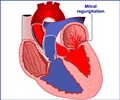Scientists at the Center for Cardiology of the Mainz University Medical Center have examined the success of more than 13,575 minimally invasive procedures on the mitral valve.

TOP INSIGHT
Mitral valve insufficiency or mitral regurgitation is a condition where the mitral valve of the heart does not close properly when the heart pumps blood.
The results show: The annual implantation numbers in Germany increased more than fivefold from 815 in 2011 to 4,432 in 2015. In total, the study included 13,575 patients who had been treated with Mitraclip®. Earlier studies referred to a maximum of 1,064 procedures. The patients were usually between 70 and 89 years old and on average they got older and older. Another important result is that the complication rate or mortality did not change significantly during the period studied. Important prognostic factors related to hospital death were cardiac insufficiency, blood transfusion due to bleeding complications, stroke, pulmonary embolism, or pericardial effusion.
The authors concluded from their findings that despite the dramatic fivefold increase in the implantation rate of the clip, the procedure has very low early-stage complication rates during hospitalization. "Catheter-assisted valvular heart valve therapy has evolved from a niche treatment of inoperable patients into a relevant and safe treatment option in only ten years, as our new study emphasizes once again", underlined von Bardeleben.
The Mainz University Medical Center occupies a leading position in the field of gentle heart valve therapy, both nationally and internationally. "In 2018, we implanted more than 700 heart valves, making us one of the largest university centers for minimally invasive heart valve therapy," stated Professor Dr. Thomas Münzel, Director of Cardiology I at the Center for Cardiology of the Mainz University Medical Center. "And more than 200 of these were Mitraclips®. This number is unique in the world." Furthermore, cardiologists have taken the opportunity to establish a new Heart Valve Unit in Mainz because of a striking increase in demand for such interventions in recent years. The advantage of the new heart valve unit: All relevant steps in the course of a heart valve implantation - from patient admission to planning and aftercare on the intensive care unit until to the discharge of patients - take place at one ward.
 MEDINDIA
MEDINDIA




 Email
Email





